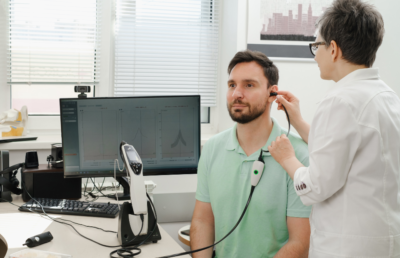Over the course of more than 75 years of studying happiness in adults, a Harvard study has revealed the “key” to happiness. The study determined that the strength and depth of the relationships in our lives determines our health and happiness levels.
Why am I bringing this up as an audiologist? A key component to relationships is a sense of closeness and honesty between the relationship partners. This requires communication — not just presence. Hearing loss can remove us from those we love most
Communication is key
Communication is a vital part of our everyday lives. We interact with people all day while working, parenting, traveling, gathering with family and friends, and running errands. Hearing loss can present challenges in these situations, which may make a person living with hearing loss feel insecure.
The emotional effect of hearing loss
Since people with hearing loss may struggle with conversations, especially in loud environments, they may start intentionally avoiding them. As a result, those with hearing loss often report feelings of social isolation, withdraw from social situations, and struggle with anxiety over meeting new people. Even meeting friends can become challenging, as people with hearing loss may feel embarrassed that they can’t understand half of what those around them are saying.
Hearing loss has also been linked to depression, earlier onset of dementia, and more rapid cognitive decline. For those living with untreated hearing loss, the effects on relationships with friends, family, and their significant other can be profound.
The effect of hearing loss on relationships
While hearing loss can affect your friendships, as you may miss invitations to some social functions, as well as your work relationships, it’s your relationship with your significant other that may suffer the most, as they may be the first to notice and experience issues.
When maintaining a healthy relationship, communication is immensely important, whether about significant matters or those that seem trivial. Hearing loss produces feelings of frustration, embarrassment, and distress for both parties in a relationship. One-on-one, a classic example is when a partner wonders why the other can’t hear their question while the TV is blaring. They raise their voice, thinking that this will solve the issue, but this makes their partner feel attacked thinking that their significant other is shouting, yelling, and is being aggressive.
When communication breakdowns occur, both sides may feel annoyed, resentful, and irritated. The good news is that with successful identification and treatment, you can reduce the impact of hearing loss on the relationships in your life.
If you aren’t hearing well
With millions of Americans living with hearing loss, you’re definitely not alone. Note that interventions such as hearing aids can highly improve your quality of life, communication, and social functioning. Only a qualified audiologist can determine whether or not you have hearing loss, and to what extent.
Fortunately, hearing tests are easy and painless. If you have hearing loss, accept the diagnosis and seek treatment as soon as possible. Today’s hearing devices are modern and discreet, and your audiologist can help you find one for you that fits your lifestyle and budget. Audiologists are specifically trained to ensure the hearing aids help reduce listening fatigue and maximize your listening environment.
If your partner isn’t hearing well
Here are a few tips that can help you better communicate with your partner living with hearing loss.
Be supportive, but tell them how you feel
Hearing loss does affect communication, which is the core of all relationships. Tell your partner about what’s bothering you and reassure them that there’s no need to worry about the stigma of wearing hearing aids.
Get their attention with a wave or a gentle tap
When talking to your partner, first get their attention with a gentle tap or a wave to avoid definitely having to repeat the first part of what you’re saying. Don’t shout or clap, as this may make your partner feel like you’re being impatient.
Speak to them face to face
As many people make up for their hearing loss with lip reading, make sure your head is not turned away from your partner when you’re talking to them.
Speak slowly and clearly
Don’t speak rapidly, as this can make it even more difficult for your partner to understand you.
Be patient
Don’t get frustrated and say “whatever” once you start sharing something with your partner, as this will make them feel insecure and like an annoyance. Keep trying, use notes if you have to.
Having hearing loss is not uncommon. If you’re affected, your relationship doesn’t have to suffer as well. Interventions such as hearing aids can not only improve your quality of life, but can also be a real relationship saver. They can reduce miscommunication between you and your partner, lower frustration and tension, make it easier for you both to have a conversation, and allow you to really tune into each other. Being able to have intimate conversations, watch TV together, and socializing together will make you feel much better about your relationship overall.
If you are experiencing communication issues due to hearing loss, don’t wait to seek treatment. Make an appointment with a hearing care professional today!




